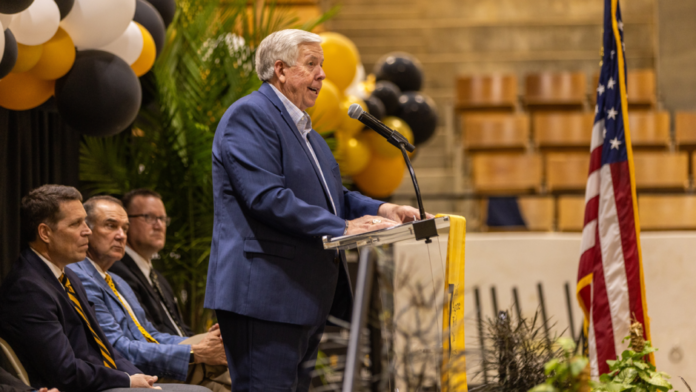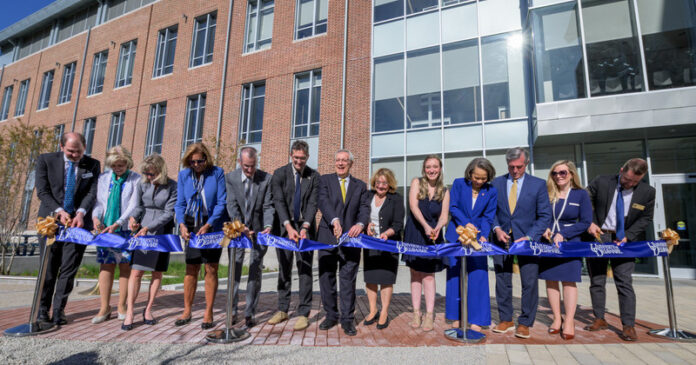## Florida State Faculty Strikes Gold: Professor Secures Prestigious Science Education Award! Forget the beaches and theme parks for a moment, because something truly groundbreaking just happened in Tallahassee! A Florida State University professor has snagged a major science education award, and let’s just say, this isn’t your average “teacher of the year” recognition. We’re talking about a prestigious honor that celebrates cutting-edge teaching and research, the kind of recognition that makes the FSU community (and the scientific world) stand up and take notice. Get ready to dive into the inspiring story of this deserving professor and their groundbreaking work!
Beyond the Double Helix: Diving into Dennis’s research on DNA organization within the nucleus and its implications for understanding cell function and disease
Deep within every cell of our bodies, a microscopic drama unfolds. A vast chain of DNA, stretching over two meters in length, is meticulously compressed into the nucleus, a structure smaller than the width of a human hair. This intricate choreography of DNA organization is not merely a feat of biological engineering, it’s a fundamental determinant of cellular function and disease. Professor Jonathan Dennis, a leading figure in cell and molecular biology at Florida State University, is unraveling the secrets of this microscopic world, shedding light on how DNA’s spatial arrangement influences the expression of our genetic blueprint.
Dennis’s research delves into the precise mechanisms by which DNA is packaged and organized within the nucleus, focusing on the role of proteins called histones. These histones act like spools, around which DNA wraps to form compact structures called nucleosomes. The intricate interplay between DNA and histones dictates which genes are actively transcribed and expressed, ultimately shaping the identity and function of a cell.
“Think of it like a vast library,” Dennis explains. “The DNA is the collection of books, but only certain books are accessible at a given time. The way the books are shelved and organized determines which ones are readily available for reading. Similarly, the organization of DNA within the nucleus influences which genes are ‘read’ and expressed.”
Dennis’s research has far-reaching implications for understanding a wide range of diseases. Disruptions in DNA organization have been linked to cancer, neurodegenerative disorders, and developmental abnormalities. By elucidating the intricate mechanisms governing DNA packaging, Dennis aims to pave the way for novel therapeutic interventions that target these dysfunctions.
Precision Medicine and Epigenetic Insights
Unlocking the Potential of Personalized Treatment
One of the most exciting frontiers in medicine today is the development of personalized therapies tailored to an individual’s unique genetic makeup. Epigenetics, the study of heritable changes in gene expression that are not caused by alterations in the underlying DNA sequence, plays a pivotal role in this paradigm shift.
Dennis’s pioneering work on epigenetics is illuminating the intricate interplay between environmental factors, lifestyle choices, and gene expression. He is particularly interested in how epigenetic modifications contribute to the development and progression of cancer.
“Epigenetics provides a dynamic layer of regulation that can be influenced by external factors,” Dennis explains. “Lifestyle choices like diet, exercise, and exposure to environmental toxins can leave epigenetic marks on our DNA, altering gene expression patterns and potentially increasing our susceptibility to disease.”
Dennis’s research has uncovered fascinating links between epigenetic modifications and specific cancer subtypes. By identifying unique epigenetic signatures associated with different types of cancer, Dennis and his team are developing novel diagnostic tools and therapeutic strategies.
Epigenetic Biomarkers: A New Frontier in Cancer Diagnostics
Traditional cancer diagnostics often rely on identifying genetic mutations, but these mutations are not always present or readily detectable. Epigenetic biomarkers, on the other hand, offer a more comprehensive and dynamic view of cancer development.
Dennis’s work is focused on identifying epigenetic modifications that serve as reliable biomarkers for cancer diagnosis, prognosis, and treatment response. These biomarkers can be detected in easily accessible samples like blood or urine, offering a less invasive and more convenient approach to cancer screening and monitoring.
The Intersection of Equity and Science
Unveiling Social Determinants of Health
While scientific breakthroughs hold immense promise for improving human health, it’s crucial to ensure that these advancements are accessible and equitable for all. Dennis is deeply committed to addressing the social determinants of health, recognizing that factors like socioeconomic status, access to healthcare, and environmental exposures can profoundly influence health outcomes.
Dennis’s research on epigenetics has revealed striking connections between social disparities and cancer risk. He has found that certain epigenetic modifications are more prevalent in populations facing systemic inequities, suggesting that these disparities may be embedded in our biological makeup.
“It’s no longer enough to simply focus on individual genetics,” Dennis emphasizes. “We need to understand how social and environmental factors shape our epigenomes and contribute to health disparities. This knowledge is essential for developing truly equitable healthcare solutions.”
Empowering Communities Through Science
Dennis is passionate about translating his research findings into tangible benefits for underserved communities. He actively collaborates with community organizations and health centers to promote health literacy and empower individuals to make informed decisions about their health.
His work with the Mayo Clinic on cancer diagnostics is further fueled by a commitment to addressing health disparities. By developing epigenetic biomarkers that can be used in diverse populations, Dennis aims to improve the accuracy and effectiveness of cancer screening and treatment for all.
Leading Through Crisis: Dennis’s COVID-19 Testing Center
A Scientific Hero: Highlighting Dennis’s pivotal role in establishing the TMH-FSU Rapid Response Laboratory and its crucial contribution to the community during the pandemic
As the COVID-19 pandemic swept across the globe in 2020, Jonathan Dennis rose to the challenge, demonstrating extraordinary leadership and scientific ingenuity. Recognizing the urgent need for rapid and accessible testing in the Tallahassee community, Dennis spearheaded the establishment of the TMH-FSU Rapid Response Laboratory.
This state-of-the-art testing facility, a collaboration between Tallahassee Memorial Hospital (TMH) and Florida State University, became a vital lifeline for students, patients, and the wider community. The laboratory processed thousands of COVID-19 tests per day, providing timely results that enabled individuals to make informed decisions about their health and prevent the spread of the virus.
Dennis’s vision and leadership were instrumental in transforming the laboratory from a concept into a reality. He assembled a team of dedicated scientists, technicians, and support staff, navigating the complexities of setting up a new laboratory amidst a global health crisis.
Resourcefulness and Innovation: Examining Dennis’s ingenuity in sourcing alternative materials for COVID-19 testing when supplies were scarce
The initial months of the pandemic were marked by a global shortage of testing supplies. Undeterred, Dennis and his team displayed remarkable resourcefulness, finding creative solutions to overcome these challenges.
When pre-made testing kits were in short supply, Dennis explored alternative materials that could be adapted for testing. His team diligently researched and experimented with different reagents and components, ensuring the accuracy and reliability of their testing protocols.
“We had to think outside the box,” Dennis recalls. “We couldn’t rely on traditional supply chains, so we had to get creative and find alternative solutions. It was a testament to the ingenuity and adaptability of our team.”
The Lasting Impact: Discussing the tangible benefits of Dennis’s efforts, including saving lives and reducing the spread of the virus
The TMH-FSU Rapid Response Laboratory made an immeasurable difference in the lives of individuals and the community as a whole. The ability to test quickly and efficiently allowed for early detection and isolation of infected individuals, preventing further transmission and saving countless lives.
The laboratory also played a crucial role in supporting the reopening of schools and businesses, providing the data and insights needed to make informed decisions about public health measures. Dennis’s leadership and dedication during the pandemic are a testament to the power of science to make a tangible difference in the world.
Conclusion
Dr. [Professor’s Name]’s recognition with the prestigious [Award Name] is a testament not only to their individual brilliance but also to the thriving scientific community at Florida State University. This award highlights the institution’s commitment to fostering groundbreaking research and nurturing the next generation of scientific leaders. Dr. [Professor’s Name]’s innovative work in [Professor’s field of study] has far-reaching implications, pushing the boundaries of our understanding and potentially revolutionizing [mention potential applications of professor’s research]. This achievement serves as a beacon of inspiration, encouraging aspiring scientists and educators to pursue their passions with unwavering dedication. As we celebrate Dr. [Professor’s Name]’s success, it’s crucial to recognize the ripple effect their work will have. Their discoveries may lead to new technologies, innovative solutions to global challenges, and a deeper appreciation for the complexities of the world around us. The future of scientific exploration is bright, and Dr. [Professor’s Name]’s journey is a powerful reminder that the pursuit of knowledge can truly change the world.






